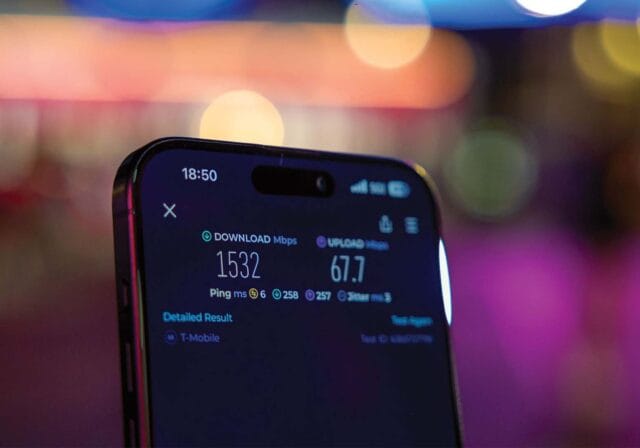Find the "sweet spot" for your gateway device
If you're utilizing an advanced wireless 5G Gateway device like the one offered by T-Mobile Home Internet, the fix is often simple. Just place your gateway close to a window or high up on an upper floor or bookshelf facing the nearest T-Mobile cell tower. You can even use the T-Mobile Internet app to help find the ideal location for your device, check signal strength, monitor connected devices, update your network name/password, and more—so you can stay easily connected at home.
Adding a mesh coverage device can also boost your home’s connectivity. Instead of relying on a single gateway device, mesh coverage uses multiple access points to help bring internet to every corner of your home and even outdoors.
Reposition your router
If your internet service provider (ISP) utilizes a standard router and there are areas in your home where slow Wi-Fi seems to be the norm, it might help to move your router around until you find an ideal spot. It can be tempting to hide wired, unsightly equipment like modems and routers behind a sofa or push them to the back of a bookshelf, but they really need to be in the clear to work their best, as certain barriers, like bookcases or metal, can make your signal weaker.
See if you’ve hit a data cap
Just like when your car runs out of gas, your home internet can burn through allotted data on some plans as well. If you suspect this might be the case, the best thing to do is to conduct a speed test. A speed test will tell you what your internet speeds are, and a quick look at your plan will tell you what they normally should be. If your speeds are as promised but you've outgrown your plan—it may be time to upgrade.
Use of VPN
A virtual private network (VPN) creates a secure connection between your device and the internet by sending your data through servers located in faraway states and countries before sending it to its final destination. This masks your IP address and allows you to browse the internet anonymously. However, the problem with using a VPN for privacy is the fact that all those extra steps can seriously slow down your downloads. If you’re always using a VPN instead of reserving them for risky situations, such as public Wi-Fi, it’s possible you’re slowing things down for yourself. If you’re on your private Wi-Fi network, consider disabling your VPN for faster speeds.
Malware
Spyware, viruses, and other malware can seriously affect your speeds as well—especially on your home computer or laptop. Spyware is sometimes used on computers to monitor actions like keystrokes and internet use, which adds delays to everything from website loading times to how quickly you can type an email. For computers, viruses act just like they do in the human body: lines of code attempt to propagate themselves over and over, usually sending copies through email. Viruses can send hundreds of emails a minute, which leaves little room for your computer to do anything else, slowing down both computer functions and internet speeds. To combat spyware, run regular antispyware checks on your computer, and to prevent and monitor for viruses, install antivirus software and make sure it’s always up to date.
Outdated equipment
It's possible that your modem and router are simply outdated, especially if you've purchased your own and haven't updated in a long time. While modems need to be replaced less frequently than routers, modems should be replaced at least every four or five years. Meanwhile, Wi-Fi technology changes at a more rapid pace, and if you have connected devices that support Wi-Fi 6, for example, but don’t have a Wi-Fi 6 router, it might be time to consider investing in newer technology.
T-Mobile Home Internet utilizes a wireless 5G Gateway device in tandem with the next generation of Wi-Fi 6 technology to keep you connected at home. See if it's available in your area now and then find a plan that's right for you. You can save even more by bundling Home Internet with a phone plan on America’s largest 5G network.
Learn More About Internet Speed
- Got A Need for Faster Internet Speeds? Try These Tips
- Is 5G Home Internet Service Faster Than Regular Wi-Fi?
Sources:
- https://www.gartner.com/en/glossary
- https://www.t-mobile.com/support/home-internet/t-mobile-gateway
- https://www.forbes.com/home-improvement/internet/what-is-internet-throttling
- https://help.speedtest.net/hc/en-us/articles/360039166853-What-is-Speedtest
- https://www.forbes.com/advisor/business/software/why-use-a-vpn/
- https://support.microsoft.com/en-us/windows/why-is-my-internet-connection-so-slow-c68cf021-c5cf-db6f-eade-7c9d8bd78aa1



